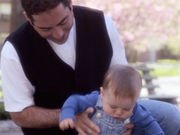Baby's Early Walking May Mean Stronger Bones as Teen
Researchers say parents can help improve odds by practicing with toddlers at home.
For all those parents who fret about how quickly their baby will learn to walk, read up.

British scientists report that toddlers who can walk, run and jump by the time they are 18 months old may have stronger bones as teenagers.
The researchers suggested that their findings could help identify those at increased risk for osteoporosis and broken bones later life.
"The findings are intriguing, as they provide a link which wasn't previously understood, primarily that how we move as a young child can have ramifications for our bone strength even 16 years later," said expert.
"We believe that stronger muscles could act as a 'marker' for this," expert said. "Being more active gives you stronger muscles, which can then apply bigger forces to the bones as we walk, run or jump, helping to strengthen bones as we grow older."
For the research, the study authors examined data compiled on more than 2,300 people born in the 1990s.
The participants' movement was assessed when they were 18 months old. The size, shape and mineral density of their hip and shin bones were also measured when they were 17 years old.
Activities such as walking, running and jumping put stress on the bones, which can make them wider, thicker and subsequently stronger, the researchers said.
The study also found that toddlers who walked early had larger muscles and may be more likely to engage in physical activity when they are older. The researchers noted that previous studies have shown that variations in muscle size accounts for about 50 percent of the difference in kids' bone strength by the age of 17.
Early physical activity and exercise had greater effects on bone strength among the men than the women, expert added.
"Importantly, the results could have implications for later life by helping medical practitioners to anticipate and detect those who are at a greater risk of osteoporosis or fractures, thus helping them to devise prevention and coping strategies," said expert. "For example, attainment of these movement skills at an early age can be easily improved even by simple parent-led walking practice at home."
Source: HealthDay News
- 244 reads
Human Rights
Ringing FOWPAL’s Peace Bell for the World:Nobel Peace Prize Laureates’ Visions and Actions

Protecting the World’s Cultural Diversity for a Sustainable Future

The Peace Bell Resonates at the 27th Eurasian Economic Summit

Declaration of World Day of the Power of Hope Endorsed by People in 158 Nations

Puppet Show I International Friendship Day 2020

